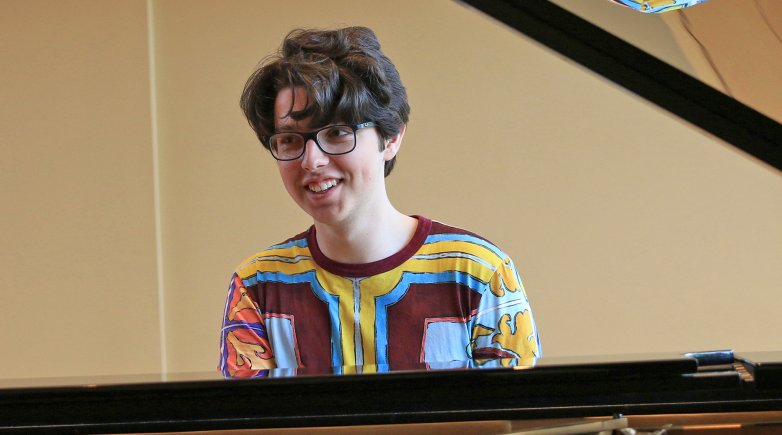Catching up with Exeter’s 2018 Vocal Competition winner
Nate Sassoon’s playful approach to music making has taken him to Paris, Vienna, Oxford and beyond.
Just a few weeks off from graduation, Nate Sassoon ’18 headed to Paris, where he spent four weeks studying music composition at the prestigious European-American Music Alliance Summer Institute. A stay in Vienna came afterward, for an intensive course in bel canto singing with Vladimir Chernov. Sassoon, a tenor, had been invited to study with the well-known baritone after winning Exeter’s 2018 Vocal Competition.
The accomplished pianist and vocalist — he’s already performed in Carnegie Hall and other venues around the world — is now happily ensconced as a music scholar at Oxford University. In addition to a rigorous regimen of classes and tutorials, Sassoon performs three times a week with Oxford’s Exeter College choir and is a member of a Gregorian chant group. He is also a keyboardist for the university’s funk band and has been awarded scholarships to study piano at the renowned Royal Academy of Music in London.
We met up with this multi-talented musician before he graduated from Exeter to learn more about the man behind the notes.
Musical doodling
Sassoon is gamely attempting to explain his musical style. Jumping up from his table in Grill, he swipes his hair out of his eyes, adjusts his glasses and says, “Here. It’s probably easier if I just show you.” Glancing over his shoulder to make sure he’s being followed, Sassoon beelines toward the Forrestal-Bowld Music Building.
It’s late May, Senior Week. In a few hours, he’ll be prepping for prom and commencement festivities. But once inside the darkened building, Sassoon takes an unhurried approach. Clad in flip-flops and an Exeter T-shirt, he sits at a grand piano and stretches his fingers across the keys.
The impromptu concert that follows gives a taste of Sassoon’s formal recitals, which can be surprisingly spontaneous events: Taking a few notes and simple tunes from his audience, he spins them out as the spirit moves him — into lyric, classical or Russian-folk tunes, and then out again — into strains of ragtime, jazz or pop.
“I enjoy playing many different musical styles juxtaposed,” he says, before launching into a long rendition of “Take Me Out to the Ball Game.” The music is in turns wistful, assertive, nostalgic and resigned. When the song is over, Sassoon looks up from the keyboard and grins. “Just think of it like doodling in the back of a notebook.”
Mischief at the keyboard
Originally drawn to Exeter for its math and science curriculum, Sassoon couldn’t keep himself away from the school’s music program, despite his best intentions. “For me, music can be an obsession,” he says. “I often use it to procrastinate.”
A four-year member of concert choir, he also played cello in the orchestra; took weekly voice lessons with Choir Director Kristofer Johnson; and studied piano and music theory with Music Instructor Jon Sakata. During his last term at the Academy, Sassoon played or sang in no fewer than eight concerts.
Sassoon says his impulse to experiment arose at an early age: “When I was a kid and given music, sometimes I would just play it differently than it appeared. So it’s a bit of the cheeky child that remains — changing the music, wanting to turning Bach into something it’s not.”
Inspiration and expression
In between riffs in the music building, Sassoon stops to chat, and the conversation resembles his performances: Throw him a question and he’s off, chasing strands of thoughts into conversational detours that are surprising and delightful — touching on the creative drive, algorithmic composing, Russian literature and the music of Childish Gambino.
The great improviser also hits upon the therapeutic nature of his musical style. “It’s definitely an emotional outlet,” he says. “It embodies both what you show to everyone else but also what you hide deep down. ... For me, this is a great sort of healing, and I don’t mean that in an insincere or phony way.”
A self-described introvert, Sassoon appreciates both the collaborative and ruminative aspects of playing. “There is an element of audience manipulation that’s unique to improv,” he says. “But I don’t view it exclusively as performative. It very much can be a personal or solitary experience. There’s improv that you do with the door closed, in complete darkness. You just hammer everything out. ... But it’s also cool in the way that it’s interactive. My friend will give me a theme or make something up, and I’ll make something out of it. That’s a lot of fun. You get to balance and play with ideas. It’s like a muse for storytelling.”
